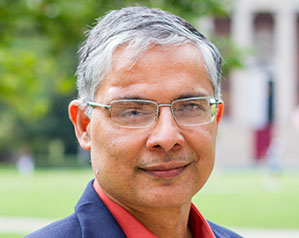 Gurdip Singh, who earned both his Master’s degree (’89) and PhD (’91) from Stony Brook University’s Department of Computer Science, has been appointed the Division Director for the National Science Foundation’s (NSF)/Computer and Information Science and Engineering’s (CISE) Division of Computer and Network Systems (CNS), He will assume his new role effective March 2, 2020, replacing Ken Calvert who has served since 2016.
Gurdip Singh, who earned both his Master’s degree (’89) and PhD (’91) from Stony Brook University’s Department of Computer Science, has been appointed the Division Director for the National Science Foundation’s (NSF)/Computer and Information Science and Engineering’s (CISE) Division of Computer and Network Systems (CNS), He will assume his new role effective March 2, 2020, replacing Ken Calvert who has served since 2016.
Gurdip is currently a Professor of Computer Science and an Associate Dean for Research and Graduate Programs at Syracuse University. Before joining Syracuse, he was a faculty member and department head of Kansas State University’s Department of Computing and Information Sciences. He previously worked with the CNS as a program director supporting the Cyber-Physical Systems, Computer Systems Research, and Critical Resilient Interdependent Infrastructure Systems and Processes programs from 2014 to 2016.
Gurdip’s research focuses on distributed and embedded systems, including synchronization synthesis, network protocols, compositional design and analysis techniques, and configurable middleware systems. He has been recognized with a number of awards including Kansas State’s College of Engineering Frankenhoff Outstanding Research Excellence Award and Graduate Teaching Award, an NSF CAREER award and an NSF Research Initiation Award.
Gurdip has more than 90 peer-reviewed conference proceedings and publications and has served on the editorial board for multiple journals. He has also been co-organizer or program chair for several conferences, workshops, and symposia. Gurdip currently serves on the Board of Directors of the American Society for Engineering Education’s Engineering Research Council.
About the Division of Computer and Network Systems (CNS) in the National Science Foundation
The CNS Division is within the Directorate of Computer and Information Science and Engineering (CISE) in NSF. It supports research and education activities that invent new computing and networking technologies and that explore new ways to make use of existing technologies. The Division seeks to develop a better understanding of the fundamental properties of computer and network systems and to create better abstractions and tools for designing, building, analyzing, and measuring future systems. The Division also supports the computing infrastructure that is required for experimental computer science, and it coordinates cross-divisional activities that foster the integration of research, education, and workforce development.
